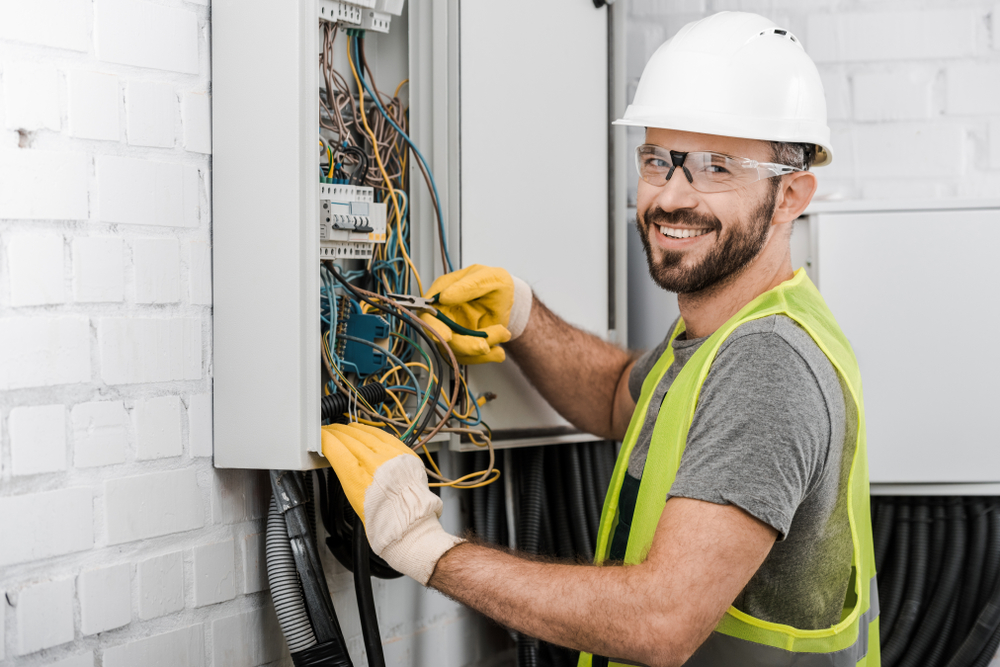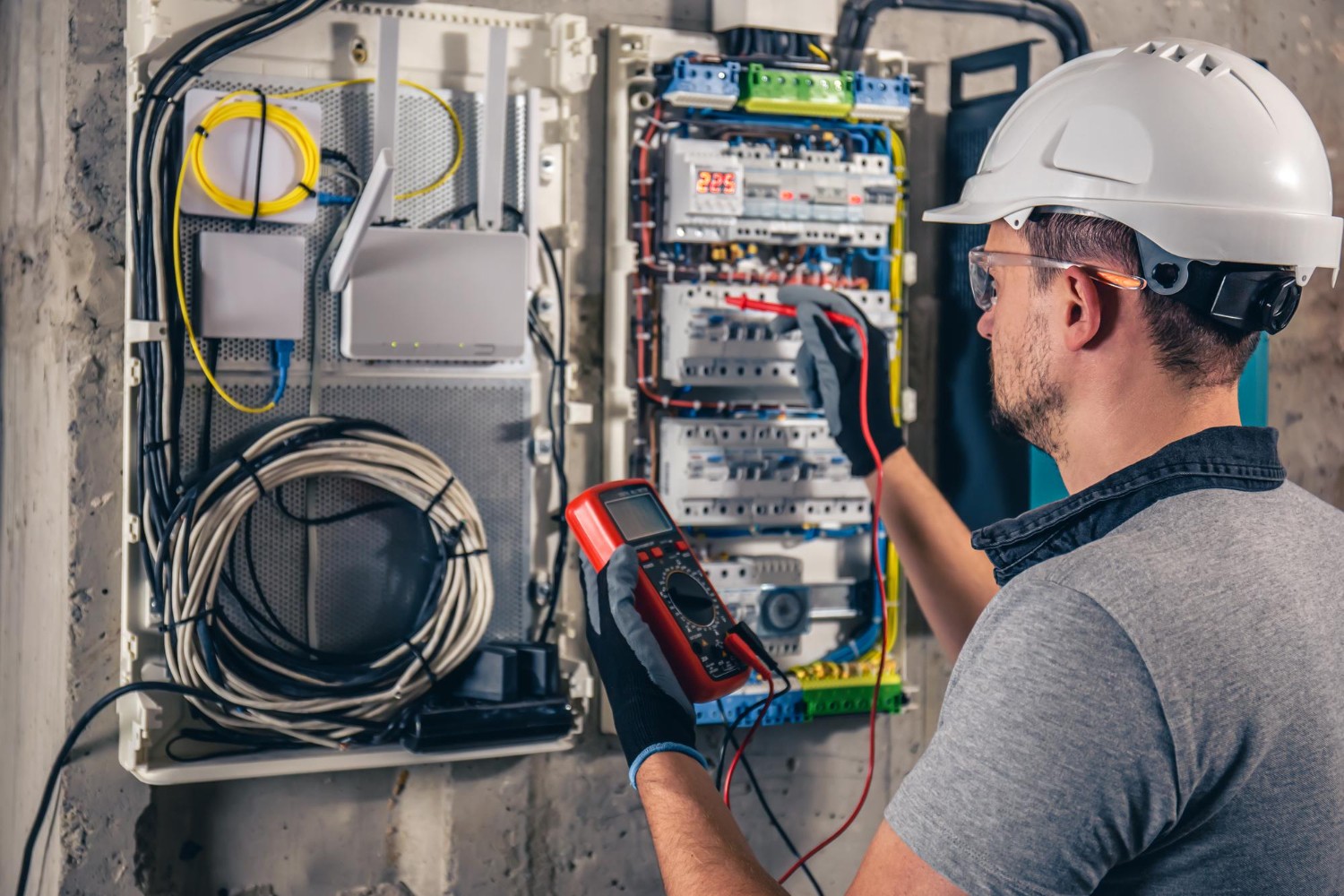Industrial Electrical Companies and Their Impact on Energy Effectiveness and Dependability
Industrial Electrical Companies and Their Impact on Energy Effectiveness and Dependability
Blog Article
The Comprehensive Function of Industrial Electricians in Ensuring Reliable Power Distribution and Electric Upkeep in Industrial Settings
The role of commercial electrical contractors extends much beyond basic electric tasks; they are integral to the security and efficiency of commercial operations. Their duties encompass setup, maintenance, and repair service of complex electric systems, guaranteeing conformity with strict safety requirements. As industries progress, the integration of innovative innovations and clever systems provides brand-new difficulties and opportunities for these experts. Recognizing how their know-how not only safeguards functional connection yet also contributes to sustainability initiatives elevates crucial concerns concerning the future landscape of electric upkeep in commercial settings. What implications does this have for the workforce and technical innovation?
Significance of Industrial Electricians
In several industrial settings, the function of electricians can not be overemphasized. Industrial electrical contractors possess specialized expertise of complicated electrical systems, consisting of high-voltage equipment and automated machinery, which are essential for modern-day industrial procedures.
Additionally, the need for competent electrical experts proceeds to expand, driven by improvements in modern technology and boosted dependence on automated systems. As industries advance, the need for electrical experts who can set up, troubleshoot, and maintain advanced electric infrastructure ends up being paramount. Their contributions prolong past mere setup; they are key players in making certain compliance with security laws and industry requirements, consequently minimizing dangers connected with electric failures.
Secret Duties and Duties
Industrial electrical contractors regularly take part in a variety of essential duties that are vital to the smooth operation of power distribution systems. One of their main tasks consists of installing, preserving, and fixing electric circuitry and equipment in industrial settings. This includes making sure that electric systems follow safety and security regulations and market requirements to stop threats such as electric fires or equipment failure.
In addition to installation tasks, commercial electrical contractors are accountable for fixing and identifying electrical problems. They use specialized tools and methods to determine faults in machinery and power distribution networks, guaranteeing that any kind of malfunctions are promptly addressed to reduce downtime. bre automation. Normal upkeep is one more essential aspect of their role, where they execute regular inspections and preventative procedures to maintain systems working ideally

Qualifications and abilities Required
Efficiency in electrical systems is crucial for industrial electrical experts, as it enables them to properly navigate the intricacies of power distribution (licensed electrical contractor). A solid structure in electrical concept, including understanding of circuits, voltage, existing, and resistance, is essential. Industrial electrical experts should have a comprehensive understanding of electrical codes and laws to guarantee conformity with sector standards
Along with technological knowledge, functional abilities are paramount. Efficiency in troubleshooting and analytical permits electricians to identify and solve concerns efficiently, reducing downtime in commercial procedures. Knowledge with various tools and devices, such as multimeters, oscilloscopes, and power analyzers, is likewise essential for efficient repair and maintenance.
Moreover, industrial electricians are typically needed to have official education and learning, typically culminating in an click site associate degree or completion of an apprenticeship program. These programs offer hands-on training and theoretical understanding, gearing up electrical contractors with the abilities required for the area.
Qualifications, such as those from the National Institute for Qualification in Design Technologies (NICET), can further enhance an electrical contractor's certifications, demonstrating know-how and dedication to the occupation. On the whole, a mix of education and learning, functional experience, and technical skills is vital for success in this demanding duty.
Safety And Security Specifications and Conformity
Compliance with safety standards is a fundamental aspect of the commercial electrical contractor's function in power distribution. Industrial electricians are entrusted with sticking to a wide variety of standards and laws developed by organizations such as the National Electric Code (NEC) and Occupational Security and Health Management (OSHA) These criteria make sure not only the secure procedure of electrical systems but likewise the security of personnel and equipment.
To attain conformity, electricians must perform normal assessments and upkeep of electrical systems, recognizing possible dangers and executing corrective actions. This consists of proper grounding, circuit security, and making use of proper personal safety devices (PPE) By maintaining a comprehensive understanding of both nationwide and local codes, electricians can properly reduce threats linked with electrical job.
Moreover, commercial electrical experts play a critical role in training workers on security methods and emergency situation procedures. This education promotes a culture of safety and security within the workplace, reducing the chance of mishaps and making sure that all workers know their duties regarding electrical safety.

Future Fads in Electrical Maintenance
As modern technology continues to progress, the future of electric maintenance in power distribution is progressively identified by the integration of anticipating analytics and smart systems. These improvements make it possible for industrial electricians to relocate past traditional reactive maintenance methods, cultivating a positive technique that boosts system reliability and effectiveness.
One considerable fad is the adoption of Internet of Things (IoT) tools, which facilitate real-time tracking of electrical systems. This innovation enables the collection of vast amounts of data, offering insights into devices efficiency and prospective failing factors. By leveraging anticipating analytics, electrical contractors can expect concerns prior to they intensify, minimizing downtime and upkeep expenses.
Furthermore, blog here the application of sophisticated automation innovations is transforming electrical maintenance. Automated diagnostic tools can rapidly identify faults and recommend corrective activities, simplifying the repair service procedure. This not only improves response times but additionally lessens human error.
Furthermore, the expanding emphasis on sustainability is driving the growth of energy-efficient options and renewable power combination. As industrial markets increasingly take on greener practices, electrical experts will play a pivotal function in maintaining these systems, making sure that power distribution lines up with environmental requirements. Overall, the future of electric upkeep guarantees boosted effectiveness, integrity, and sustainability.
Conclusion
Finally, commercial electricians are crucial to the capability and safety of commercial settings. Their competence in mounting, maintaining, and repairing electrical systems makes certain dependable power distribution, which is necessary for functional Home Page efficiency. Adherence to security requirements and guidelines better mitigates risks within the work environment. As modern technology advances, the integration of smart systems and IoT devices will improve precautionary upkeep approaches, advertising sustainability and energy efficiency in industrial settings. The role of industrial electrical contractors will continue to broaden in importance.
The duty of commercial electrical experts expands much beyond standard electric jobs; they are important to the stability and efficiency of commercial procedures (industrial electrical contractors). Industrial electrical contractors possess specialized knowledge of intricate electrical systems, consisting of high-voltage devices and automated machinery, which are essential for modern-day commercial operations
Moreover, commercial electrical contractors collaborate with engineers and various other professionals to create and execute effective electric systems customized to particular commercial needs.Efficiency in electrical systems is important for commercial electrical experts, as it allows them to successfully browse the complexities of power distribution.In conclusion, commercial electrical contractors are crucial to the performance and security of industrial atmospheres.
Report this page